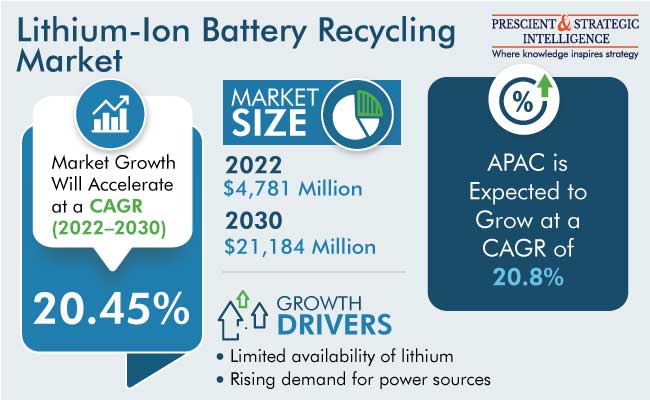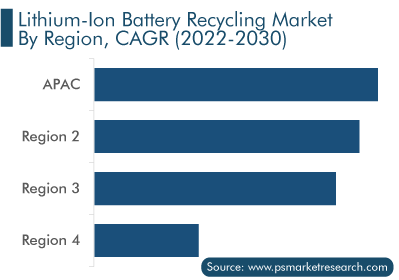Report Code: 12004 | Available Format: PDF
Lithium-Ion Battery Recycling Market Size and Share Analysis by Battery Type (LCO, LFP, LMO, NCA, NMC), Recycling Process (Hydrometallurgical Process, Pyrometallurgy Process, Physical/Mechanical Process), Battery Component (Active Material, Non-Active Material), End User (Automotive, Power, Electrical & Electronics) - Global Industry Demand Forecast to 2030
- Report Code: 12004
- Available Format: PDF
- Report Description
- Table of Contents
- Market Segmentation
- Request Free Sample
Market Overview
The global lithium-ion battery recycling market is estimated to generate $4,781 million in 2022, and it will advance at a compound annual growth rate of 20.45% during 2022–2030, to reach $21,184 million by 2030.
The major driving factors are the limited supply of lithium metal and the rising popularity of EVs across the globe, due to the subsidies given in different countries. Essentially, the declining cost of EVs owing to road tax relaxations and government subsidies is driving their popularity. This, in turn, increases the need for these batteries, especially for e-scooters and e-motorcycles.

Lithium–Cobalt Oxide Battery Dominates Market
The LCO battery category held the largest market share in 2022, and it is expected to maintain its dominance throughout the projection period. The high energy density and discharge voltage of LCO batteries, which makes them more suitable for power tools, consumer electronics, such as mobile phones, laptops, and tablets, and hybrid/full electric vehicles, is the key driver for the market in this category.
Lithium–Nickel–Manganese–Cobalt Oxide Category To Witness Notable Growth
The NMC category is expected to grow at a significant CAGR, of 21.4%, during the forecast period, due to the long life, higher energy density, lower cost, and rising usage of these variants in energy storage systems and EVs.
Automotive Industry Consumes Most of Recovered Battery Materials
The automotive category, which dominated the market in 2022, is also set to witness the highest CAGR, of 20.9%, during the forecast period. This can primarily be credited to the booming uptake of electric motorcycles, scooters, buses, trucks, and cars across the globe. In addition, the limited availability of lithium drives the recycling of these batteries. With the increasing demand for electric vehicles, used Li-ion batteries are also predicted to see an expansion in demand in the automotive sector. The declining price of these power storage devices, along with the growing efficiency of electric vehicles, is also a growth factor.
This is because the battery makes up over 50% of an EV’s sales price; hence, with the reducing battery costs, EVs are becoming affordable. Moreover, the Indian government approved the Phase II of the Faster Adoption and Manufacturing of (Hybrid &) Electric Vehicles in India (FAME) scheme in April 2019, which entails an investment of INR 8,596 crore as incentive for EV buyers.

North America Is Set To Experience Significant Growth
The North American lithium-ion battery recycling market is expected to grow at a significant rate in the upcoming years. This can majorly be ascribed to the U.S. being one of the biggest markets in the world for these energy storage systems. The growth in EV usage in the region, with the government's incentives and other policies, is projected to drive this domain in the next few years. Moreover, the rising investment by top players in the electric vehicle industry, along with the setup of the charging infrastructure, will enhance recycling demand.
Market Growth in Asia-Pacific Is Expected To be Significant in Coming Years
APAC is expected to grow at a significant CAGR, of 20.8%, during the forecast period, on account of the rising adoption of EVs. Essentially, the rising awareness among customers of the environmental benefits of EVs in the developing countries of the region is set to boost the industry expansion. To fulfill the requirement for Li-ion batteries in automobiles, manufacturers are focusing on the recycling of the used ones.
Moreover, the Indian government implemented updated Battery Waste Management Rules in 2022, in order to make battery manufacturers responsible for collecting those that have reached the end of their life, recycling them in an environment-friendly manner, and recovering the key materials, also setting targets for the minimum amount of material to be recovered. This is since the country imports most of these power sources and their raw materials from the People’s Republic, which makes the end products, especially EVs, costly for the common folk.

Europe Is Expected To Witness Significant Growth
Europe is also expected to grow at a significant CAGR during the forecast period, because of the European government's high recycling efficiency standards. Further, the growing awareness on zero-emission vehicles is the key driving factor for this market.
Limited Lithium Availability Is Pushing Market Growth
The growing usage of lithium-ion batteries across various applications has resulted in the rising concerns over the limited availability of the base metal. The mining of This metal has a detrimental impact on the environment, which includes water pollution due to chemical leakage. Owing to this fact, Li-ion battery recycling has picked up of late. Moreover, since no such material at present has characteristics similar to lithium, battery manufacturers are increasingly focusing on the reuse of lithium batteries, to provide an adequate amount of the metal for batteries for different uses.
In this regard, in June 2021, Germany-based chemical manufacturer BASF announced plans to start the construction of a new battery recycling and prototype manufacturing unit at its cathode active material (CAM) facility in Schwarzheide. When lithium-ion batteries reach their end of life, the company targets to extract cobalt, manganese, lithium, and nickel, by using an improved solution.
Rapidly Growing EV Demand also Propelling Market
In recent past years, the demand for recycled lithium-ion batteries has risen significantly in the automotive industry. This has been a result of the rising adoption of electric vehicles, specifically in the U.S., Germany, Sweden, Norway, the Netherlands, and China, along with a few developing Southeast Asian countries, due to the rising concerns for the environment. According to the IEA, in comparison with 2020, electric car sales almost doubled to 6.6 million (almost 9%) in 2021, and the total number of electric cars on the street was 16.5 million. Moreover, in an optimistic forecast, the IEA expects more than 300 million electric cars on the roads by 2030, which is, in turn, predicted to drive the reuse of lithium-ion batteries.
| Report Attribute | Details |
Historical Years |
2017-2022 |
Forecast Years |
2023-2030 |
Market Size in 2022 |
$4,781 Million |
Revenue Forecast in 2030 |
$21,184 Million |
Growth Rate |
20.45% CAGR |
Report Scope |
Market Trends, Drivers, and Restraints; Revenue Estimation and Forecast; Segmentation Analysis; Impact of COVID-19; Companies’ Strategic Developments; Market Share Analysis of Key Players; Company Profiling |
Segments Covered |
By Battery Type; By End User; By Recycling Process; By Battery Component; By Region |
Explore more about this report - Request free sample
Growing Electrical & Electronics Sector
The electrical & electronics industry is one of the largest consumers of lithium-ion batteries, owing to their usage in mobile phones, laptops, tablets, and several other electronic gadgets. With the growth of the electrical & electronics sector, particularly in the developing nations of the APAC region, such as China, India, and Thailand, the demand for these sources of energy has been on the rise. Moreover, due to the limited availability of lithium against its projected high-volume demand in the electronics sector, the market for recycled lithium-ion batteries holds a strong potential for growth in the coming years.
In this regard, the increasing investments in the electrical & electronics sector are likely to fuel market growth across developing nations. For instance, the Made in China 2025 initiative aims at making China the global powerhouse of high-tech industries, along with reducing its dependence on foreign technology imports.
Key Players in Lithium-Ion Battery Recycling Market Are:
- ACCUREC Recycling GmbH
- RECUPYL S.A.S.
- American Manganese Inc.
- Retriev Technologies
- Li-Cycle Corp.
- Umicore Group
- Neometals Ltd.
- Hunan Brunp Recycling Technology Co. Ltd.
- Batrec Industrie AG
- Ganfeng Lithium Co. Ltd.
Lithium-Ion Battery Recycling Market Size Breakdown by Segment
The study uncovers the biggest trends and opportunities in the market, along with offering segmentation analysis at the granular level for the period 2017 to 2030.
Based on Battery Type
- Lithium Cobalt Oxide (LCO)
- Lithium Iron Phosphate (LFP)
- Lithium-Ion Manganese Oxide (LMO)
- Lithium Nickel Cobalt Aluminum Oxide (NCA)
- Lithium Nickel Manganese Cobalt Oxide (NMC)
Based on Recycling Process
- Hydrometallurgical Process
- Pyrometallurgy Process
- Physical/Mechanical Process
Based on Battery Component
- Active Material
- Non-Active Material
Based on End User
- Automotive
- Power
- Electrical & Electronics
Geographical analysis
- North America
- U.S
- Canada
- Europe
- Germany
- U.K.
- France
- Italy
- Spain
- Asia-Pacific
- Japan
- China
- India
- South Korea
- Australia
- Latin America
- Brazil
- Mexico
- Middle East and Africa
- Saudi Arabia
- South Africa
- U.A.E.
The market for lithium-ion battery recycling solutions was valued at $4,781 million in 2022.
LCO variants dominate the lithium-ion battery recycling industry.
APAC dominates the market for lithium-ion battery recycling solutions because it is the largest producer of these batteries, EVs, and consumer electronics.
The biggest drivers for the lithium-ion battery recycling industry are the limited availability of lithium and the rising demand for such power sources.
The market for lithium-ion battery recycling solutions will witness a CAGR of 20.45% during 2022–2030.
Want a report tailored exactly to your business strategy?
Request CustomizationWant an insight-rich discussion with the report author?
Speak to AnalystOur dedication to providing the most-accurate market information has earned us verification by Dun & Bradstreet (D&B). We strive for quality checking of the highest level to enable data-driven decision making for you
Our insights into the minutest levels of the markets, including the latest trends and competitive landscape, give you all the answers you need to take your business to new heights
With 24/7 research support, we ensure that the wheels of your business never stop turning. Don’t let time stand in your way. Get all your queries answered with a simple phone call or email, as and when required
We take a cautious approach to protecting your personal and confidential information. Trust is the strongest bond that connects us and our clients, and trust we build by complying with all international and domestic data protection and privacy laws